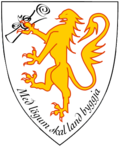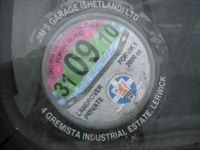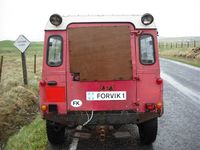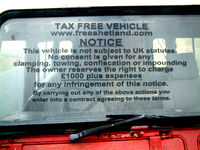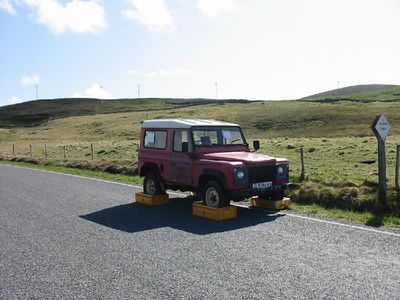Sovereign State of Forvik
Sovereign State of Forvik | |
|---|---|
| Motto: Með løgum skal land biggja | |
  | |
| Capital | None defined |
| Official languages | English |
| Demonym(s) | Forvegian |
| Government | Sovereign State |
• Steward | Stuart Hill |
| Legislature | Ting |
| Establishment | 21 June 2008 |
| Population | |
• Census | 4+ |
| Currency | Forvik Gulde |
| Time zone | UTC, BST |
Website Official Website | |
The Sovereign State of Forvik is a micronation located on the 2.5-acre (10,000 m2) island of Forewick Holm in the Shetland Islands of Scotland.
Forvik was created in June 2008 by the island's disputed owner, sole occasional occupant, and Cunningsburgh resident, Stuart Hill when he unilaterally declared Forvik to be a British Crown Dependency. Although Hill asserts the matter is for the Monarch to decide, a spokesperson for the United Kingdom Ministry of Justice stated that under the Constitution of the United Kingdom, Forvik is part of the Shetland Islands and as such is subject to United Kingdom legislation. The Shetland Islands Council Convenor Sandy Cluness has not dismissed Hill's actions out of hand and said official bodies would wait and see how it progressed.
Etymology
The name Forvik Island was coined by Hill who asserts that it means "island of the bay of sheep". 'Wick' is a development of 'vik', a Norse word for bay. Holm is a common name in the Orkney and Shetland Islands for a small, rounded island.
"Forvik" is not a recorded historical form, but a pseudo-Norse version of "Forewick", which is the name of a headland on the adjacent island of Papa Stour.
History
Around mid June 2008, Hill claimed to have "recently" become the owner of the small and previously rather insignificant, relatively unknown islet. He elaborated on this around mid July, by stating that the islet had been donated to him by someone who wished to support his campaign on Shetland's legal and constitutional position. The name "Forvik" is first known to have been used on June 18, 2008 when Mr Hill's intention to declare "Forvik Island", or "Forvik" for short, a dependent territory was made public. The Declaration of Dependency was subsequently made on June 21, 2008. Hill had written to the HM Government about his intentions to declare Forvik a British Crown Dependency but received no reply. He later declared Forvik an independent state, known as the Sovereign State of Forvik.
A vast amount of information is now available. Mr Hill is understood to have established residency on the isle sometime shortly before plans to announce dependence were made public. His accommodation is understood to have been a tent, but he has now erected a 5M x 5M house, and it is also believed that he is/was the sole inhabitant of the isle. There are no known records of permanent resident(s) on the isle in the past, and given that it only extends to approx one hectare in total area, it would seem unlikely that it could have supported inhabitants. However, satellite imaging shows what could appear to be the remains of some sort of circular construction on its SSE tip, therefore its use as some form of residence at some past time cannot be ruled out. No announcement was made by Hill in the early stages whether he planned to make Forvik his permanent home, or occasional residence, but it appeared at that time, that occasional was most likely, at least initially. Hill confirmed this around mid July by making a statement that although he spent as much time as he could on Forvik, and had mobile/cell phone coverage, he did not have internet access. Therefore it had been, and would remain necessary for the forseeable future, that he spend some of his time in his Shetland Mainland office. This had been particularly necessary immediately after making the Declaration of Dependence. Hill also added that he didn't "expect to spend the first winter on Forvik", presumably due to the very limited facilities and services likely to be established within and to/from the territory by that time.
Boat Problems
In the late evening of September 14, 2008 Hill was rescued, by a lifeboat, from the Sound of Papa. According to him, he had decided to move his self-designed and built "landing craft" style small boat to a more sheltered anchorage at Forvik, as she was starting to fill with water due to a rising swell driven on SE winds gusting to Force 6 and 7. Once underway in darkness, Hill, apparently having completely underestimated the full strength of the swell, found his vessel quickly swamped, resulting in both outboard motors becoming submerged to the point that they failed.
Apparently, as always, undaunted by being involved in yet another "Captain Calamity" style incident, Hill is quoted as saying that his immediate plans are to attempt to salvage his partly submerged vessel, which he had anchored between Forvik and Papa Stour before being rescued from it. September 15 proved unsuitable for a salvage attempt, due to sea conditions, and the vessel remained at anchor all day, a further attempt was to be made of the 16th, conditions permitting, but the vessel was found to be gone from anchor. A subsequent coastal search, found her, largely buried, with engines still attached on the Kirk Sands, Papa Stour, only a short distance from where she'd been anchored.
The engines were quickly rescued and taken away to be cleaned and salvaged. Despite a heavy pounding and being buried to the gunwales in sand, the boat was dug out, re-floated and driven back to the mainland. Repaired and strengthened, she is now back in service.
Current Status
It is unclear whether, as claimed owner and sole known resident of this new territory, Mr Hill automatically assumes any additional title(s) or position(s) of governing authority. However, while little detail has yet become available, it would appear that some form of basic constitution, government and regulation is in place. It had been stated that Forvik Island recognised neither the EU or any UK government, it was a dependency answerable directly to only the UK Crown, which it recognised as Head of State, but only insofar as the rights conferred by King Christian I of Denmark, when he pawned Shetland in 1469 in lieu of outstanding dowry in connection with the marriage of his daughter Margaret, to King James III of Scotland in 1468. Mr Hill states he has written to Her Majesty Queen Elizabeth II offering his services as "Steward of Forvik". The Declaration also lays claim to all seabed rights, including fish, mineral and oil, up to 200 miles from its shores, or the median between itself and its neighbours. Hill's first known attempt to exercise any of these rights was made on July 18, when he publicly invited interested parties with the ability and a "proven track record", to enter in to negotiations concerning oil exploration. The territory will also be a tax haven with no Income Tax, Corporation Tax, VAT or other tax instituted by the UK Government; the only tax payable in the territory will be a payment by citizens towards the running of the state - similar to the old Norse Skat. This tax has been set initially at the annual rate of one Forvik Gulde, which is the territory's own currency, backed by gold, with an exchange rate based on current gold values of approx £55 = 1 Forvik Gulde, and due to be made available later in 2008. The Skat collected annually would be formally offered to the UK Crown, as Head of State, but then immediately claimed back for the running of the territory.
Forvik Island is declared to have no religious or party political affiliations, and no connection with any other organisation.
A "Forvik Island" Flag has been created, featuring the Shetland Flag as a background, overlaid with a shield containing the rampant lion of Norway (without crown), holding aloft a legal scroll, and the motto 'Með løgum skal land biggja', which is also the motto of the current local government, the Shetland Islands Council. A fuller explanation of the symbolism of this design can be found here. Postage stamps are also planned, but no further details are available at the moment. It is unclear if the registration of companies in this tax free enviornment is yet possible, however other planned offshore banking and financial services are still only in the planning stage, and are to be made available at a later date. Plans for other duty free activities and vehicle registrations have also been mentioned, but no further details are available at this time.
An unclear statement has been made by the Forvik Island authorities concerning the witholding of taxes from UK National and Local Government, which will then be deposited in a holding account, the interest from which will be available to the land owning citizens of Forvik as income, and used as collectively decided by them. However, it is not specified on whom or what these taxes may have been tried to be levied, or why.
Citizenship
Applications to become a citizen of Forvik Island have been invited by Mr Hill. Two forms of citizenship are currently available, a land owning citizen, and a non-land owning citizen (changed to "Honorary Citizen" on June 23, 2008. In the initial invitation made public on June 21, 2008 land owning citizenship was only open to Shetland residents, and currently remains so, it was and is limited to a maximum of 8000 plots of land (individual plot size approx one square metre), and was offered at a cost of 5 Forvik Gulden (approx £275). It might be reasonable to speculate that 8000 plots are an intentional number, and symbolic of the 8000 Florins of the Rhine for which Shetland was pawned to Scotland by Denmark in 1469, but Mr Hill has neither confirmed or denied any connection. Land-owning citizenship is further limited to a maximum of 20 plots to any one individual and their immediate family. Non-land owning citizenship was open to "suitable applicants" (the definition of which was not given) worldwide, and was offered at a cost of one Forvik Gulde (approx GB Pounds Sterling 55). On June 23, 2008 the cost of land-owing citizenship was reduced to 2 Forvik Gulden (approx GB Pounds Sterling 110), Non-land owning citizenship became known as Honorary Citizenship, remaining at the previous cost of 1 Forvik Gulde (approx GB Pounds Sterling 55) and was open to anyone who "support the ideals and aspirations of Forvik". In addition a Forvik Passport was first offered on June 23, 2008 and available for purchase by Honorary Citizens, at a cost of 20 Forvik Groats (approx £11.00, 100 Forvik Groats = 1 Forvik Gulde), and entitled Honorary Forvik Citizens the right to buy duty free supplies from "Federated Suppliers" in Shetland, but no information was made available concerning which products were obtainable in this manner, or whom the "Federated Suppliers" in Shetland were. For reasons not given, this Passport option was withdrawn again sometime on June 24, 2008. Also on June 24, 2008 the following seemingly mathematically impossible statement was made concerning the Forvik currency: "1 Gulde is about £60 sterling. There are 100 groats in a Gulde. One groat is about £12".
Land-owning citizens will have one vote per person concerning issues which arise in the territory, but profits from the income of the territory will be distributed on a per plot basis. The land owning voters will collectively form a ruling council for Forvik Island, to be known as the Ting. The Ting will, via a continous online voting system, decide on how profits of the territory will be divided between projects undertaken to benefit the territory, and payouts to its citizens. Non-land owning citizens/Honorary Citizens do not enjoy voting rights, but will be entitled to receive a share in the profits of the territory, as decided by the Ting.
Mr Hill has also extended an invitation to all landowners in Shetland to join with Forvik Island in a Federation, which he envisions may possibly develop in to a legitimate alternative form of local government.
Facilities
A landing place for small vessels is available (subject to tidal and weather conditions) on the foreshore of the island, and it is stated that there are plans to construct a better harbour in the near future. Currently there is no permanent accommodation or living facilities on the island, but work is underway on a 5 metre x 5 metre permanent basic accommodation unit, which one report states will be constructed from laminated timber, hardboard, polythene, turf and netting. Mr Hill is further quoted in the same report as saying that he had been granted planning permission for this construction by the "Forvik planning authorities" "without any problems and no red tape", suggesting that some basic form of building regulation and control also already exists within the territory. There are tentative plans for the provision of landing facilities and ancillary services for aircraft, however this has only reached the site identification stage at the time of writing.
General Information
Until such time as all 8000 plots of land on Forvik Island have been sold, one Forvik Gulde will be deposited in a holding account for each plot that is sold. Once payment for all 8000 plots has been received, this money is to be used for a "purpose to be disclosed at a later stage to the benefit of Shetland as a whole". Presumedly Mr Hill has already made plans for this sum, and will reveal them in time. In the initial citizenship pricing structure the total possible final amount within this holding account would have been 8000 Forvik Gulden (approx £440,000). The proposed fate of the remaining balance of 4 Forvik Gulden per plot sold at a cost received for each plot sold of 5 Forvik Gulden, which would have amounted to a maximum of 32,000 Forvik Gulden/approx £1.76 Million, was not stated at that time. Under the revised pricing structure for plot sales introduced on June 23, 2008 the maximum possible final amount within the holding account remains at 8000 Forvik Gulden (approx £440,000), and the remaining maximum possible balance from plot sales is reduced to an equal sum, no details of the proposed fate of which have yet been revealed.
As no information is available to suggest otherwise, it is at this stage probably reasonable to presume that all constitutional, governmental and regulatory plans and decisions which have thus far been made and stated concerning this new territory, are solely the personal plans and decisions of Mr Hill. Likewise, any title, position and/or role/decision of public office which is held/made, or appears to be held and/or have been made from the evidence avaiable, are all roles created by Mr Hill, held by himself, and the plans/decisons of them are his own personal ones.
Response and Further Information
The response to the above announcements on a UK national governmental level, when approached for comment, has been very little so far. Simply to re-state that as far as they are concerned the territory has been, and still is, an integral part of the U.K. However Mr Hill points out, that as in their response they referred to the territory in question as Forvik, and not as Forewick Holm, this constitutes recognition by the U.K. Government that Forvik exists as an entity. There has been no known official response on a regional governmental level from the Scottish Parliament, and its local member, MSP Tavish Scott is quoted in one report as simply stating that a percentage of Shetland's population are known to be in favour of some greater degree of autonomy than at present. Spokespersons representing the local government from both elected and civil service sectors have both been reported as denying having any prior knowledge of the creation of this new territory, and making only minimal general comment concerning its existence. However, in a Shetland News report, SIC Convenor Sandy Cluness who in the past has been active in seeking greater local autonomy is stated as not having dismissed Mr Hill's actions "out of hand", but was waiting "to see how this goes".
Speaking on 25 June, Mr Hill mysteriously predicted that his new scheme would "come to a confrontation [with the authorities] at some point', either "physical or in the courts"'.
After a somewhat lengthy silence on the subject, it was reported in the local press on March 12, 2009 that some minor developments had recently occured concerning Mr Hill's attempts to push the UK Government in to proving the legality of their authority over Forvik. Firstly in the shape of a Council Tax bill from the SIC for the sum of £205.79, levied on the accommodation hut Mr Hill constructed on Forvik in the summer of 2008, and covering the period December 15, 2008 to the beginning of April 2009. According to Mr Hill he had replied to the SIC that he would not pay any such tax, as he considered it illegal and fraudlent, to cease sending him any further communications on the matter, and to initiate legal proceedings if they wished to pursue the matter.
Mr Andrew Hall, Revenue Services Manager with the SIC confirmed that they had billed Mr Hill for Council Tax for his hut on Forvik, as they had a statutory obligation to do with every building listed as a "house" by the local Area Assessors Office.
In addition Mr Hill was quoted as saying that he had been advised by the UK Government department of Her Majesty's Revenue & Customs that as of 2006/07 he was not required to file any Self Assessment Forms (presumably Income Tax Self Assessment Forms), and that any threat of penalties (presumably discretionary monetary penalties for overdue/late filing of such forms) had been cancelled. The report however did not state whether this applied to all, or only part(s) of Mr Hill's activities.
The official was launched on June 21, 2008 by Mr Hill. This site went down sometime between 01.30 BST Sept. 25th and 21.30 BST Sept 27th 2008, and came back online as a remodelled version before 18.00 BST Sept 29th 2008.
Since his somewhat unusual arrival in Shetland in 2001, as a shipwrecked lone sailor, Mr Hill has been a longtime and tireless campaigner for Shetland Independence, arguing that, in his opinion, the claim by Scotland and the U.K. on Shetland is invalid. In his pursuit he has undertaken numerous initiatives, both conventional and unusual, to publicise and attempt to gain support for his stance, with varying degrees of success.
Ownership Dispute
It was revealed in the local media on March 6, 2009 that a private dispute had erupted between Mr Mark King, the owner of Forewick Holm up until at least the commencement of Mr Hill's involvement with the isle, and Mr Hill.
The Shetland Times newspaper reported Mr King as stating that as the Scottish Land Registry, the Crofters Commission and the SIC did not recognise Mr Hill as the legal owner of Forewick Holm, the isle was still his property, and would remain so "until it was fully paid for". He also went on to explain that at the time he had originally agreed to grant Mr Hill permission to use Forewick Holm for his campaign, that he had been on a bi-polar "high" due to the depression that he suffers from.
Mr King went on to state that he felt Mr Hill had misused the isle, as he'd erected structures on a designated Site of Special Scientific Interest, and may also have disturbed Otters in the area. Other allegations included that he objected to Mr Hill's selling of "Honorary Citizenships" of Forvik Island and had requested Mr Hill stop this practice on a number of occasions, but had been ignored. Mail addressed to Mr Hill had also been sent to his address in Papa Stour, according to Mr King, concerning debts owed by Mr Hill relating to failed previous ventures, involving "two separate five figure sums", including a printer's bill for The Shetland Independent Newsletter, and pertaining to a failed wrought iron company he had started in the U.S.A. This, Mr King appeared to feel was the final straw, as the "stress" of having "debt collectors" contacting his address was proving detrimental to his health, and he claimed he had written to Mr Hill demanding that he stop his activities immediately.
In response Mr Hill is reported as having stated that on a unspecified date in April 2008 Mr King had given Forewick Holm to him as a gift, and that a document had been drawn up and signed by himself and Mr King in the presence of two independent witnesses concerning the transfer of ownership of the isle from Mr King to himself. Mr King however described this document in his comments, as "not worth the paper it is written on".
Mr Hill went on to deny that Mr King had at any time advised him he objected to his selling of "Honorary Citizenships", or to erecting structures on the isle, and went on to state that on their last meeting "about a month ago" when they had bumped in to each other on Papa Stour, that there "had been no hint of a problem". The only negative issue Mr Hill claimed he was aware of, was that in a "recent" phone call with Mr King, they had discussed the fact that Mr King was having problems with a "couple of Government Agencies" who appeared to have made the assumption that Mr King had benefited financially from disposing of the isle, and according to Mr Hill, to which he had offered to provide documentation to Mr King to prove that this was not the case.
Concerning the communications relating to previous debts incurred by himself being directed to Mr King's address, Mr Hill explained that the friendship between Mr King and himself went back to before May 2007 when he had started to publish The Shetland Independent Newsletter, and Mr King had been made aware of these issues from around that time and during the lifetime of their friendship as they arose. According to Mr Hill it had been Mr King's suggestion that communications of this nature should be sent to his address, and then passed on to him. Mr Hill then went on to say that as Mr King now appeared to be aware of the detailed contents of these communications, he could only presume that Mr King had taken upon himself to open and retain these communications, instead of forwarding them as received as per their original agreement.
Warning
In what may seem a somewhat curious development, Mr Hill gave public notice, by way of a letter to The Shetland News dated April 14, 2009. That he had been "advised", that an attempt might be made to land on Forvik, and that anyone planning on doing so should be aware that "there are devices in place at all landing places on the island that can hole the hull of any boat and others designed to foul propellers. Some are permanent installations and others cannot be de-activated without the proper knowledge".
Vehicle Registrations & other Vehicle Documentation
On April 29, 2009 Hill announced via the Forvik.com website that a vehicle now bore a Forvik registration, and had been put on the public highway on the Shetland Mainland. The vehicle, a well known British four wheel drive make bears the plates "FORVIK 1", a "FK" nationality sticker, and displays a paper disc on the windscreen, extremely like its UK equivalent, confirming its road tax, which permits it to use the public highway, has been paid on Forvik. It is unclear up to which date the disc claims validity. The digits are 31 09 10, which either refer to October 31, 2009, or the non-existing September 31, 2010. The vehicle also bears at least two large stickers giving notice that it is not subject to UK statutes, and that its owner does not consent to any clamping, towing, confiscation or impounding of said vehicle. In the event of an infringement of any of the list of prohibited actions, the owner also reserves the right to levy a charge of £1000 plus expenses upon the infringee. It also states that anyone undertaking any of the unconsented items listed will be in effect entering in to a contract whereby they agree with all of the foregoing terms.
The vehicle in question is understood to be have been acquired by Hill shortly before he made the above announcement. It was believed to have been around twenty five years old, in quite poor condition, and parked in a lay-by near Sandness at the time its existence was made public.
From the initial announcement it was not possible to ascertain exactly what Hill hoped to achieve or prove by undertaking this venture in this way.
Fishboxing
The vehicle was reportedly still in position on May 3, but had been thoroughly "fishboxed" at a time unknown by person(s) unknown during the previous night. "Fishboxing" is the popular term given to the prank of jacking up a parked vehicle and sliding a fishbox, usually plastic as they are most slippery, underneath one or more of its wheels, so that when lowered back down the wheel is inside the box making the driving or towing of the vehicle concerned virtually impossible. In this case all four wheels were placed in plastic fishboxes.
By May 7 the vehicle was still in place, but in a damaged condition, with numerous parts broken off and strewn around it, having been significantly vandalised over the preceding three days. In the prevailing strong winds, which almost certainly had exacerbated the extent of the damage, and the spread of detached parts, the remains of the vehicle and detached parts were considered a hazard to other road users, and were removed from the site in the latter part of the day by a vehicle recovery truck, with the local Police and Mr Hill in attendance.
On May 8 Hill posted on the Forvik.com website his account of the vehicle's removal, and of events initiated by himself immediately subsequent. According to him, he had been contacted by the Police who requested that he remove the vehicle due to its dangerous condition, whch he refused to do. The Police then ordered the vehicle recovery truck to remove it, and when Hill arrived on scene he found two officers already there, awaiting the truck's arrival. They enquired if he wished to make a formal complaint concerning the damage to the vehicle, which he declined. He then enquired of the officers if they were willing to sign a statement prepared by himself, confirming they had read and understood the notices posted on the vehicle relating to the possible consequences of removing or tampering with the vehicle, which one of the officers agreed to do.
The recovery truck was some time in arriving, and the initial two officers had to leave, but were replaced by another, who arrived at around the same time as the recovery truck. Hill pointed out the notices on the vehicle to both the recovery truck crew, who elected to await direct instructions from the expected Police officer. He also claims he made sure the replacement officer was fully aware of the notices prior to ordering the loading to proceed.
The following day (8th), Hill claims he visited the Garage business from which the recovery truck had been hired, and obtained the bill for the work they had undertaken, and that it is his intention to bill the Police as per the terms of the contract detailed in the notices which were on the vehicle concerning removal etc.
Hill claims that the police telephoned him to say they were taking no action on having no tax disc displayed because they were referring that to the DVLA. They were taking no action on having no MOT because he was not driving the vehicle at the time. He says he then wrote to them asking for written confirmation of this call and admitted driving the vehicle about twenty miles, but has received no response. He says the DVLA subsequently wrote demanding £147, or they would take him to court and that he responded saying that when they produced evidence of their authority in Shetland he would pay. There has so far been no response to this letter. He says it is extraordinary that the police took no action and that any ordinary motorist would be in court almost immediately. Hill says "Apparently Northern Constabulary and the DVLA have joined the list of UK authorities unwilling to prove their authority in court. This list now includes: HMRC VAT office, HMRC Income Tax Office, SIC Planning Department, SIC Finance Department, The Crown Estates, Scottish Natural Heritage, The UK Treasury, Northern Constabulary and the DVLA. How disobedient do I have to be before one of these authorities is prepared to explain how they derive their authority?"

